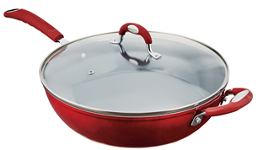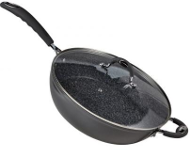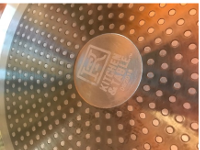
THIS SECTION IS FOR NEWS AND INTERESTING STORIES RELATED TO FOOD, NUTRITION AND FOOD PROCESSING. THEY ARE NOT NECESSARILY RELATED TO KOSHER BUT MAY BE OF INTEREST TO THE KOSHER CONSUMER, MANUFACTURER OR MASHGIACH.
March 27, 2019 - from DW:
"Cafe Salomon is Leipzig's first kosher restaurant since the Holocaust. The Saxon city, where tens of thousands of Jews were persecuted in the 1930s, now has one of the most active Jewish communities in eastern Germany."
"Hummus, fried fish and matzo ball soup: Those are some of the things you can find on the menu at Cafe Salomon, Leipzig's first kosher restaurant since World War II."
"The restaurant does not serve fowl or beef, because, according to kashruth, milk and many meat products have to be prepared and served separately — too complicated and expensive a process for Cafe Salomon. However, some fish are on the menu, as well as vegetarian and vegan options."
March 27, 2019 - from IFT and American Academy of Pediatrics:
"The American Heart Association (AHA) and the American Academy of Pediatrics (AAP) released a joint statement on March 25, calling for a tax on sugar-sweetened beverages. The goal, they say, is to limit children’s intake of sugar-sweetened drinks, which can pose health issues like diabetes and high cholesterol."
"Among the policy’s six calls to action is a tax that would deter excess purchases of sugary liquids. The groups cited a 2017 systematic review and meta-analysis that revealed that each 10% increase in price, such as a tax, reduced sugary drink consumption by 7%. “Given the success of tobacco and alcohol taxes in reducing adolescent use and consumption of these products, policy makers should consider enacting policies that raise the price of sugary drinks."
"Eliminating the advertising subsidy for nutritionally poor foods and beverages marketed to children would prevent approximately 129,000 cases of obesity over a decade at a cost of $0.66 for each unit of BMI reduced."
"The AAP’s third call to action involves expanding the nutrition education and obesity prevention component of the Supplemental Nutrition Assistance Program (SNAP) to further emphasize the health benefits of fruits and vegetables and the health risks of sugary drinks and added sugars. Also, the policy statement recommends the use of retailer incentives and new retail stocking standards to reduce purchase of sugary drinks and increase purchase of healthier foods."
"The fifth call to action is the adoption of policies and incentives that “support decreased consumption of sugary drinks through environmental changes, such as promoting healthier options (like water and milk) and decreasing access to and portion sizes of sugary drinks in all locations where children and adolescents are present." "The AAP recommends that hospitals serve as a model and implement policies to limit or disincentivize the purchase of sugary drinks."
Ed. note: Sugar taxes in some other countries such as the UK have caused companies to switch to using white grape juice as a sweetener to avoid the taxes.
March 19, 2019 - from FoodDive:
March 15, 2019 - from Ingredients Network:
"Gluten-free foods have suffered from the perception that they cannot equal gluten-containing products, in terms of both nutrition and texture. Researchers now claim that genetically engineered wheat could change all that, but are manufacturers (and consumers) ready for it? z'
"Researchers from Wageningen University in The Netherlands say they have used CRISPR-Cas9 gene-editing technology to target and eliminate the elements of gluten that trigger an autoimmune response in people with coeliac disease, a disorder that affects about 1-2% of the population. Using this technique, the researchers say the gluten is safe for coeliacs and retains its unique baking characteristics, such as providing a light, airy texture in bread."
"The technique faces some major regulatory hurdles, as well as long-standing barriers in convincing consumers of the benefits of genetically edited foods. In Europe, the European Court of Justice ruled in 2018 that CRISPR should fall under GMO legislation, meaning the wheat would have to undergo strict food safety and environmental tests before it could be grown in the region. In the meantime, the researchers suggest it could be grown in the United States and imported back into the EU. "
"If the 'gluten-safe' wheat can overcome such obstacles – and it is a big ‘if’ – it could be a boon for manufacturers of gluten-free products. Without gluten, baked goods may be lacking in some nutrients, notably fibre and B vitamins, they may be dense or dry, and some gluten-free flours also add a gritty texture. Nevertheless, it is a booming market. According to Innova Market Insights, the number of new products making a gluten-free claim grew an average of 24% a year from 2013 to 2017.
"Manufacturers have turned to hydrocolloid suppliers for texturizing ingredients like xanthan, gellan, locust bean and guar gum to help replace gluten’s binding qualities. ""There is a strong appetite for more recognisable, kitchen-cupboard ingredients, which has led many manufacturers to look for other solutions. "
"For now, the researchers say their discovery is five to ten years away from commercialisation, leaving plenty of time to debate the future of coeliac-friendly wheat, and to convince manufacturers and consumers of its benefits."
March 19, 2019 - from Cision PR Newswire and SpecialtyFood:
"An independent test of top selling honey products sold in U.S. grocery stores found zero instances of adulteration. In all, the 30 top selling products were tested, all of which represented the top items in the honey category as determined by Nielsen's recent 2018 honey category research. These brands account for approximately 40 percent of the honey sold in the U.S. retail market. The study was commissioned by the Honey Integrity Task Force, an organization made up of representatives from the entire honey industry including importers, packers, producers, marketing cooperative members and an organization that specializes in honey supply chain management."
"An independent third party company, RQA Inc., was hired to conduct the study. They pulled two sets of each of the 30 samples from retail shelves across the country. The honey sample brand names were masked, and the samples were sent to two independent German laboratories that specialize in honey testing, QSI and Intertek. ""Each lab conducted two adulteration tests, the AOAC-approved 998.12, 13C-Isotope Mass Spectrometry and 13C-IRMS (EA IRMS)/ +LC-IRMS method for C4/C3 adulteration. Both tests are well recognized methods designed to determine if any sugar was added to the honey."
"Of the 28 products that were labeled at retail locations as pure honey, the tests from both labs confirmed the samples were not adulterated. Two of the 30 products were actually labeled as honey blends, not pure honey. Both labs correctly identified them as "adulterated." One was an imitation honey made with maltitol syrup and the other was a combination product with both corn syrup and honey."
"Honey is one of nature's original products, and it is made by bees with no additives or preservatives of any kind. It is one of many food products that can be vulnerable to what is known as economically motivated adulteration, a term used when unscrupulous players within the honey supply chain use cheaper ingredients to lower their production costs and then sell the product as pure honey. The honey industry has put safeguards in place over the years to minimize the chances that a product labeled as honey will be adulterated with sugar or syrup."
March 14, 2019 - from Journal Sentinal and SpecialtyFood:
US Senator "Baldwin, a Democrat from Wisconsin, and U.S. Sen. Jim Risch, a Republican from Idaho, reintroduced legislation Thursday that would combat what Baldwin described as the “unfair practice of mislabeling non-dairy products” using dairy descibing terms such as 'milk'.
"The renewed push for legislation on the issue comes as many dairy farmers in Wisconsin and elsewhere find themselves struggling to survive amid low milk prices and decreased demand for their products."
" The legislation would require the Food and Drug Administration to provide guidance for nationwide enforcement within 90 days on non-dairy products made from nuts, seeds, plants, and algae. The FDA would also have to report to Congress in two years to hold the agency accountable."
March 13, 2019 - from Arutz 7:
"For the first time in history, a kosher catering company will open in Dubai, United Arab Emirates."
"Currently, the company serves only dairy and fish-based meals, and does not yet have a consistent kashrut supervisor."
"There are plans to open a kosher restaurant as well.
March 13, 2019 - from APNews:
"A new report says pills often contain so-called “inactive” ingredients capable of causing allergic or gastrointestinal reactions in small numbers of people sensitive to specific compounds."
"And it’s hard for those patients, or even their doctors, to tell if a pill contains an extra ingredient they should avoid, researchers from the Massachusetts Institute of Technology and Boston’s Brigham and Women’s Hospital said Wednesday. When the doctor sends a prescription, the pharmacist issues whatever the person’s insurance covers — without discussion of inactive ingredients that are buried in the drug’s labeling."
"Drugs contain an 'active ingredient,' what you hope will help your health. Patients may not realize that inactive ingredients make up the rest of the pill, substances that aren’t supposed to directly affect your health. They’re used to make it easier to absorb the drug, or to improve the taste or extend the shelf life."
"The study analyzed data on inactive ingredients from a database of more than 42,000 prescription and over-the-counter medicines. An average pill contains eight inactive ingredients, but some contain 20 or more."
"The report found:



March 13, 2018 from the CPSC :
Kitchen & Table 5.5 qt. Sauté Pan with glass lid has been recalled because the glass lid can crack or shatter during normal use, posing a laceration hazard.
This recall involves H-E-B’s Kitchen & Table 5.5 qt. Sauté Pans with glass lids. The affected products were sold in red and gray. There is a Kitchen & Table logo and production date code on the bottom of the pans. Only pans with a date code from 05/2018 through 12/2018 are included in the recall.
H-E-B received eight reports of the glass lid cracking or shattering, including one report of an eye injury.
Remedy: Consumers should immediately stop using the recalled sauté pans with glass lid and return them to H‑E‑B for a full refund.
Sold At: H‑E‑B stores in Texas and online at www.heb.com from May 2018 through January 2019 for about $30.
Consumer Contact: H-E-B toll-free at 855-432-4438 from 8 a.m. to 6 p.m. CT Monday through Friday or online at www.heb.com and click on Product Recalls for more information.
March 10, 2019 - from NBC News and Yeshiva World:
"Jewish and Muslim communities have united in opposition to a new law in the Flanders region of Belgium, which bans the practices required for both Halal and Kosher meat. That has meant such products have become harder to find and more expensive in recent months."
"With the help of an American legal fund, a group of Muslim and Jewish organizations have taken legal action and hope to overturn the new law. The Belgian Constitutional Court heard their arguments in January and is expected to rule on the case within weeks."
"The groups say that the new regulation infringes on their civil rights, preventing them from freely practicing their religion."
"Belgian law had long required animals to be stunned before slaughter to prevent unnecessary pain. It did, however, grant an exception for ritual slaughter, a practice in Islamic and Jewish religious laws in which the animals are not stunned first. Both halal and kosher slaughter require the use of a very sharp knife to slit the animal’s throat in one stroke and sever the major structures and vessels."
"The new law in Flanders came into effect in January removing the religious exception. In the Wallonia region, a similar law will come into effect at the end of August."
"Many Muslims feel the laws are a result of Islamophobia rather than a concern for animal rights. For Jews, they are also an uncomfortable reminder of a darker period in European history. In 1933, one of the first laws the Nazis enacted was a ban on kosher animal slaughter."
"Belgium is home to larger populations of both Muslims and Jews, who fear that the restrictions on ritual slaughter could spread further throughout Europe. There are around 500,000 Muslims in Belgium and 30,000 Jews."
"Antwerp is home to one of the largest Jewish ultra-Orthodox populations in Europe."
"The Jewish community has long imported beef and lamb from slaughterhouses in France, Hungary and Poland, but the new law forced the closure of a poultry producer just outside of Antwerp."
| The information posted is from secondary sources. We cannot take responsibility for the accuracy of the information. |
| Comments to webmaster@kashrut.com
© Copyright 2024 Scharf Associates |
|
|||||||||||